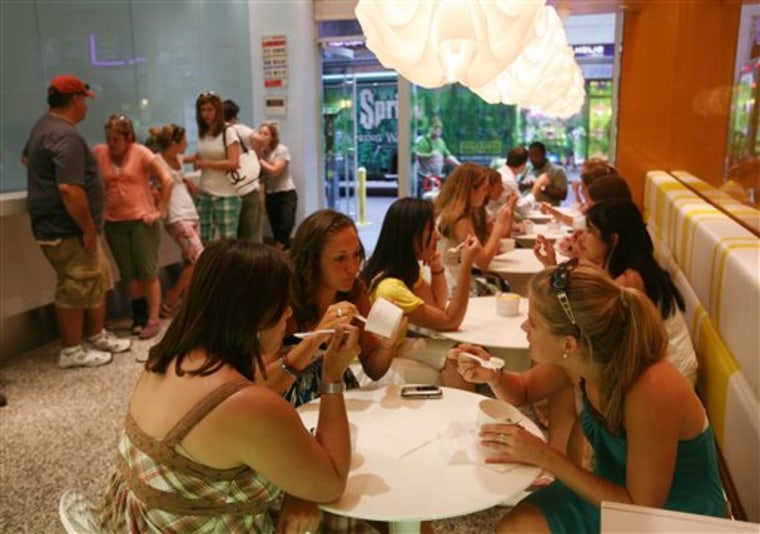Leonardo DiCaprio has a Red Mango yogurt machine in his office. Paris Hilton and Lindsay Lohan have been photographed clutching Pinkberry yogurt cups while ducking the paparazzi.
Frozen yogurt, trendy during the 1980s and early '90s, has made a comeback — but this time with an edge. Companies selling the soft stuff are opening stores with hip decor and pulsating music that draw a young crowd. Celebrity bloggers like Perez Hilton have posted pictures of young Hollywood stars spooning yogurt into their mouths.
Veterans of the last yogurt boom, including TCBY, Penguins, and Tasti D-Lite are still operating, but their newer rivals have a different business model, going after a younger market that wants not just a frozen dessert, but an experience. The question for Pinkberry, Red Mango and the rest of this new generation of yogurt purveyors is whether they'll be able to grow into national brands — especially since their target market is known for having fickle tastes and a short attention span.
Moreover, the industry is already getting crowded, raising the possibility of a shakeout at some point. In Los Angeles, where the industry's latest incarnation began about two years ago, consumers can now choose from chains like Snowberry, Roseberry, Berri Good, Kiwiberri, Yogurtland, Yogurberry and IceBerry.
The concept behind Red Mango and Pinkberry is to keep customers in the store, rather than have them buy their yogurt and just leave as in more traditional yogurt and ice cream places. And so the decor at a Pinkberry includes $350 Philippe Starck chairs and $391 Le Lint lights.
"We're trying to create the coffeehouse environment," said Dan Kim, chief executive of Red Mango. "We're creating an ambiance, a point of relaxation, a meeting place."
And unlike the variety of flavors offered by the older shops, Pinkberry and Red Mango generally offer just two flavors — plain and green tea — and they are more tart than the previous generation's products. The average purchase price is about $5, but can double with added toppings like fresh berries, granola and Fruity Pebbles.
Both Pinkberry and Red Mango rely on slick marketing campaigns and celebrity connections. The trend toward healthy eating might be a key to the longevity of the new frozen yogurt chains.
"They started in Los Angeles and flourished there for a reason," said Tom Coggia, a Seattle resident who tried Pinkberry after hearing buzz about it. "Because L.A. is all about image and hype and being seen — being seen doing things that are cool. People see a photo of Paris eating Pinkberry and they want it."
The big chains have their roots in South Korea. Shelly Hwang and Young Lee, two South Korean immigrants, launched Pinkberry in West Hollywood, Calif. in 2005. While there are claims that they were inspired by Red Mango, which operates over 140 locations in South Korea, the Pinkberry owners maintain they got their inspiration from Italian gellatarias.
Pinkberry now operates 59 locations in California and New York, and plans to have 75 open by the end of 2008. Red Mango operates 30 shops in seven states, with plans to open dozens more in the coming year.
"The question is, are you going to just be a niche player or will you be a national chain," said Harry Balzer, vice president of NPD Group, a consumer marketing research firm that tracks how Americans eat. "They clearly are getting a nice buzz within the population. But we often mistake our willingness to try new things as a trend."
Some believe the new kind of frozen yogurt, because of its tartness, might have a hard time catching on with Americans who prefer very sweet desserts. Pinkberry, Red Mango and others make their products using active cultures, which increases the healthy attributes of yogurt but also increases its tartness.
Executives from both chains believe they can make it nationally; they say they are inundated with requests from potential franchisees. Kim, a former Wall Street investment banker, said his stores attract between 400 and 1,500 customers a day, and each location brings in about $1 million in annualized sales.
Those kind of numbers have caught the attention of investors.
Pinkberry has grown in part with cash from a venture capital firm co-founded by Starbucks Corp.'s chairman and CEO, Howard Schultz. Red Mango last week announced that former Blockbuster Inc. CEO John Antioco invested $12 million into the concept, and will serve as chairman of the company's board of directors. Other advisers include movie producer John Davis, the son of billionaire Marvin Davis, movie producer Roy Lee, and Stone Canyon Venture Partners.
Pinkberry CEO Ron Graves said the company has certainly benefited from its pop culture fame — and doesn't plan to run from that image. However, he feels Pinkberry has the product to back up all the hype.
"We're not out there trying to get people to endorse Pinkberry," he said. "It has been a natural phenomenon. We're focused on building the right infrastructure, growing in other regions, and building a fantastic company."
Still, this could be a fad that comes and goes like the last, something that Heidi Miller knows about. In 1981, the former bodybuilder opened Heidi's Frogen Yozurt in a cramped storefront tucked into a shopping center in Irvine, Calif. She built the company to 120 locations before cashing out by selling an 86 percent stake in the company in 1989. The chain is no longer in operation.
She's not entirely convinced the new generation has staying power: "There's always a window of opportunity, they are hot for a couple years and die down — everything is cyclical." She points out that getting "celebrities hooked" on the product doesn't automatically bring success, and senses that the market might become too crowded.
"Just like with Heidi's, there will be a shakeout," she said. "Only the strong will survive."
